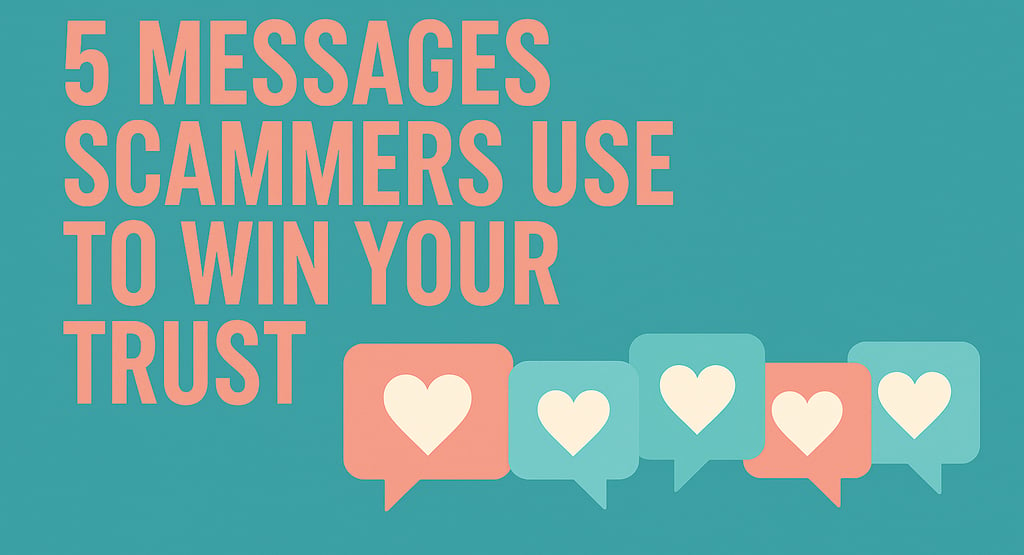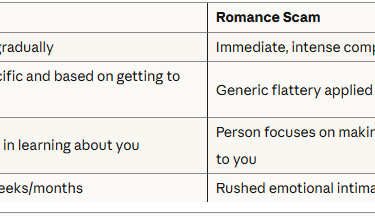5 Messages Scammers Use to Win Your Trust
If you've ever felt swept up by someone's attention or questioned whether a relationship was too good to be true, you're not alone. Discover the five messages scammers consistently use to win your trust—and what healthy relationships actually look like in comparison.
10/2/202510 min read


Quick Answer: Romance scammers and online fraudsters rely on five key psychological manipulation tactics to build false trust: claiming you're special, positioning themselves as victims in crisis, offering exclusive secrets, creating a sense of destiny, and isolating you as their only real support. Understanding these trust-building messages is the first step to protecting yourself while staying open to genuine connections.
Nobody wakes up thinking, "Today, I'm going to fall for a romance scam." Yet millions of people become victims of romance fraud, military romance scams, and trust manipulation every year. What's striking isn't that these scams exist—it's how often they work. And they work because scammers understand something fundamental about human nature: we all want to be believed in, to be valued, and to feel connected to another person.
The messages scammers use aren't random. They're carefully crafted psychological hooks designed to bypass your natural skepticism and tap directly into your deepest desires and vulnerabilities. Understanding these messages isn't about becoming paranoid or cynical. It's about being informed—about protecting yourself from online romance fraud while remaining open to genuine human connection.
Message 1: "You're So Different From Everyone Else" — The Uniqueness Trap
This is perhaps the most powerful opening move in a scammer's playbook, and it works with devastating consistency.
When someone tells you that you're different, that you stand out, that they've never met anyone quite like you before—it feels incredible. We all want to be seen as special, as someone worth noticing. In a world where we often feel ordinary or overlooked, this message hits deep.
How Romance Scammers Use This Message
Fake profiles flood targets with admiration and attention, making elaborate statements about how unique the person is:
"I've talked to thousands of people, but there's something about you"
"I can't believe how rare it is to find someone like you these days"
"You're nothing like anyone I've ever met before"
"I feel like I've known you my whole life"
Military romance scammers frequently use this approach, claiming they've never connected with anyone who understands them like you do.
The dangerous part is that there's just enough truth in this approach to feel authentic. You might actually be an exceptional person. You might have qualities worth celebrating. But when someone is laying on the compliments this heavily, especially very early in a connection, it's worth pausing.
Real Relationships vs. Scam Relationships
What to notice: In healthy connections, you do become special to someone. But this happens gradually. People who genuinely appreciate you learn why you're special through getting to know you—not by deciding it on the first conversation. Scammers need to establish emotional investment quickly because they're working on a timeline.
Pay close attention to the pacing. If someone is making grand declarations about your uniqueness before they actually know you, that's a yellow flag worth noting.
Message 2: "I'm Going Through Something, and I Really Need Your Help" — The Crisis Manipulation
This message is particularly insidious because it appeals to one of our noblest human qualities: the desire to be helpful and supportive.
The scammer shares a crisis—a business emergency, a medical issue, a legal problem, or a travel situation (common in military romance scams). The story is detailed enough to feel real but vague enough that you can't easily verify it. They tell you they've tried everything else and their other options have fallen through. And then comes the key moment: they admit they feel comfortable asking you because you're the only one they can really trust.
Why This Manipulation Works
This crisis narrative does two things simultaneously:
Makes you feel special and trusted — which relates back to the first message
Shifts you into a caregiving mindset — Humans are wired to help those we care about, and romance scammers exploit that wiring deliberately
What makes this particularly effective is that it feels different from a direct request for money. There's a narrative arc. You're not being asked to send cash to a stranger; you're being asked to support someone you've grown to care about who's in genuine distress. The emotional logic feels sound, even if the premise is completely false.
Common Crisis Scenarios Used by Romance Scammers
Medical emergency while deployed (common in military romance scams)
Business investment opportunity that requires immediate capital
Travel visa or emergency leave costs
Legal fees or immigration issues
Equipment or vehicle breakdown
Family emergency requiring funds
The Escalation Pattern
The concerning part is that these requests tend to escalate. The initial crisis gets "resolved," but then another emerges. Each time, the scammer gets better at reading how far they can push and how much you're willing to give. What started as a small ask becomes a pattern of increasing financial requests.
Real Crisis vs. Romance Scam Crisis
Real people in real crises do sometimes reach out to those they trust. But healthy people have:
Other support systems — family, colleagues, professional resources
Transparency — They explain what they've already tried and why it didn't work
Consistency — One crisis, not an endless stream of emergencies
Reciprocal relationships — They're not always the ones needing help
If someone's life is an endless series of crises, particularly ones that always seem to require your specific help, that pattern itself is worth questioning.
Message 3: "I Have Something Special to Share With You, But You Can't Tell Anyone" — The Secrecy Tactic
This message creates a sense of exclusive access and conspiracy. It makes you feel like an insider, like someone special who's being given information or opportunities that others aren't worthy of.
How Scammers Use Secrecy
Scammers deploy this tactic in multiple fraud schemes:
Investment schemes: "limited-time investment opportunity" not available to the general public
Romantic manipulation: details about their life they "haven't shared with anyone else"
Recruitment fraud: business "methods" that only certain people know about
Military romance scams: classified information or special access because of their military status
The Psychology of Secrecy in Relationships
The secrecy component is crucial to the scam's success. By keeping it quiet, you become complicit in the secret. You're not just receiving information; you're becoming part of an exclusive group. That feels good. It makes you feel trusted and important.
But secrecy, in a healthy relationship, is very different from privacy. Genuine people share things in confidence with those they trust, yes—but when that confidence is being asked of you as a condition of the relationship, something's off.
Red flags for unhealthy secrecy:
Being asked to keep the relationship itself secret
Told not to mention them to friends or family
Pressured to hide financial transactions
Asked to use coded language in communications
Warned that telling others would "ruin" something
Why Scammers Need Isolation Through Secrecy
Scammers thrive on secrecy because it prevents verification and outside perspective. They need you isolated in the secret, unable to ask friends or family whether this opportunity or revelation makes sense. The moment you bring light to it, the spell often breaks.
This doesn't mean legitimate opportunities or private conversations don't exist. They do. But there's a critical difference between respecting someone's privacy and being asked to participate in deliberate deception or to keep your relationship itself secret.
Message 4: "Our Connection Is Rare and Meant to Be" — The Destiny Narrative
This message is heavy with destiny. It suggests that meeting you was more than coincidence—it was fate.
The Language of Destiny Scams
Scammers use romantic or spiritual language to create false inevitability:
"I wasn't supposed to meet you, but the universe knew"
"This is too perfect to be chance"
"I've never felt this way with anyone before"
"We were meant to find each other"
"This is written in the stars"
"You're my soulmate"
Why Destiny Narratives Are Powerful
This message works by flattering not just you, but the relationship itself. It's not just that you're special; it's that the two of you together are cosmically special. It's written in the stars. It was meant to happen.
This narrative is powerful because it bypasses rational thinking. When something feels fated, when it feels like destiny, we're more likely to overlook inconsistencies or warning signs. After all, who argues with fate?
Real Connection vs. False Destiny
Healthy relationships:
Feel meaningful but are built on consistent actions
Develop over time, not overnight
Show up as imperfect reality, not perfect fantasy
Build on genuine knowledge of the real person, not an idealized version
Allow space for doubt, questions, and normal relationship challenges
Scam relationships:
Feel instantly fated and cosmically special
Developed intensely and quickly
Present a perfect narrative with no room for questions
Build on fantasy versions of who the person is
Create urgency that doesn't allow for skepticism
Real love is something you build through time, through consistent actions, through demonstrating reliability and genuine care. Connection isn't something that happens overnight. Love isn't something you feel with certainty based on a few messages.
The scammer is using romantic or spiritual language to create a sense of inevitability that serves their purpose. They're not trying to build something real with you; they're trying to lock you into a narrative where any deviation from supporting them feels like a betrayal of destiny itself.
When to be suspicious: If someone is pushing the idea that everything about your connection is rare and fated, slow down. Ask yourself what they're actually doing. Are they showing up consistently? Are they getting to know the real you? Are they interested in the actual, imperfect reality of who you are? Or are they interested in the fantasy they've constructed?
Message 5: "I Trust You With Everything—You're My Only Real Friend" — The Isolation Trap
This message creates a sense of responsibility and emotional debt. By positioning you as someone's only real source of support, the scammer makes it harder for you to step back or question what's happening. How could you abandon someone who depends on you so completely?
What This Message Does
This message accomplishes multiple manipulation goals simultaneously:
Creates emotional responsibility — You feel obligated to support them
Isolates you — You're less likely to talk to others about the relationship
Prevents outside perspective — You can't get advice from friends or family
Establishes dependency — Your primary role becomes being supportive and believing
Silences skepticism — It becomes harder to ask questions without feeling disloyal
Why This Isolation Tactic Is Dangerous
What's insidious about this message is how it can feel like a compliment. Being someone's only real friend sounds noble. It suggests they see something in you worth trusting completely. But healthy friendships and relationships aren't exclusive like this.
Healthy people have:
Multiple sources of support
Friends and family connections
Professional relationships
Work relationships
Community involvement
Other people they can turn to in crisis
Unhealthy dependency looks like:
One person is the entire emotional support system
Pressure to be available at all times
Guilt when you need time for yourself
Isolation from other relationships
Constant reassurance needed
The Difference Between Intimacy and Isolation
It's important to understand: healthy intimate relationships do involve deeper trust and vulnerability than you share with acquaintances. But even in the most intimate relationships, there are other people in someone's life. A spouse has friends. A partner has family. A person in a committed relationship still has colleagues and community members.
Real intimacy allows for: other relationships to exist simultaneously without threat or guilt.
Manipulation demands: that you be the only person who matters, the only person they can trust, the only person they depend on.
When someone suggests that you're their only real support, that should trigger a reconsideration. Not out of cruelty, but out of realism. One person cannot and should not be responsible for being someone else's only meaningful connection. That's not a sign of special love; it's a sign of unhealthy dependency, and it's often a deliberate manipulation tactic.
The Pattern Behind All Five Messages: What Makes Them Work
Looking at these five messages together, you might notice something important: they all appeal to the desire to be special, to be needed, to be trusted, and to be part of something meaningful. These are legitimate human needs.
Why These Needs Make Us Vulnerable
The problem isn't that scammers use these messages—it's that they weaponize them. In healthy relationships, you do become special to someone. You do build trust. You do show up for people you care about. The difference is that in healthy relationships:
Development is gradual — not compressed into days
Admiration is reciprocal — not one-directional
Requests escalate appropriately — not constantly increasing
Person demonstrates consistency — through actions, not just words
Interest is in the real you — not a fantasy version
Scammers compress what should be a long journey into a short sprint. They accelerate emotional intimacy artificially. They create a sense of urgency and exclusivity that prevents you from thinking clearly or checking in with anyone else.
How to Protect Yourself Without Becoming Cynical
The goal here isn't to make you paranoid about every new relationship or suspicious of everyone who shows you attention. That would be a sad way to live, and it would close you off from genuine connection.
Instead, the goal is to help you recognize patterns and to trust your own instincts.
Red Flags to Watch For:
Rapid declarations of love or deep connection
Excessive compliments before you really know each other
Avoidance of video calls or video verification
Pressure to keep the relationship secret
Urgent requests for money or financial help
Stories that change or inconsistencies
Isolation from your other relationships
Emotional intensity that feels unbalanced
Protective Practices for Online Dating
Build accountability:
Tell friends who you're talking to
Share profiles or conversations with trusted people
Get outside perspectives on people you're interested in
Don't keep your dating life secret
Verify before investing:
Ask for video calls early and regularly
Notice if they consistently have excuses
Check social media presence
Ask specific questions and notice if answers change
Trust your gut when something feels off
Maintain healthy boundaries:
Don't send money to people you haven't met in person
Keep financial information private
Don't rush into commitment
Notice how they treat you when you ask questions
Pay attention to whether they follow through on what they say
What Healthy People Do Differently
Real people in genuine relationships will understand these precautions. They won't be offended if you want to take things slowly. They won't push you to keep your relationship secret. They won't make you feel guilty for talking to friends or asking clarifying questions. Real connection can handle scrutiny because it's built on reality, not manipulation.
Key Takeaway: Trust Your Instincts
Falling for a romance scam isn't a sign of stupidity—it's a sign of humanity. The best, most caring, most trusting people are often the targets because scammers are looking for people with big hearts. The fact that you're reading this means you're already taking a step toward protecting yourself while staying open to genuine connection.
As you navigate your relationships and opportunities, carry this knowledge with you: the messages that should make you most careful are often the ones that feel the best. Not because there's anything wrong with feeling good about someone or something, but because that's exactly the feeling scammers are trying to create.
Remember: Healthy relationships don't require you to abandon your skepticism. They actually welcome it.
You're Not Alone in This
If you've ever wondered whether a relationship might not be safe, or if you've experienced something that left you questioning what was real, you're not alone. Many people have walked this path, and many have found clarity and healing on the other side.
The most important thing you can do right now is to evaluate your current relationships honestly and protect yourself proactively.
Get Support and Guidance
If you'd like to explore your relationships more deeply and understand what healthy connection actually looks like, I've created a free guide that walks through the key signs of safe, healthy relationships: "Is Your Relationship Safe?"
This guide is designed to help you:
Reflect on your current connections with clarity
Identify patterns you might have missed
Understand what healthy relationships actually look like
Feel more confident in your own judgment
Take protective steps before problems escalate
You can access it for free here: https://scamprooflove.com/free-guide
The goal isn't to make you afraid of love or connection. It's to help you find relationships and opportunities that are genuinely safe, where you can be your authentic self without having to constantly second-guess what's real. That kind of connection is absolutely worth protecting—and absolutely worth waiting for.


© 2025. ScamProofLove. All rights reserved — Protect your heart, your wallet, and your peace of mind.
support@scamprooflove.com
